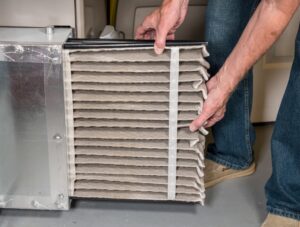
As summer begins to heat up, you want to stay cool inside your home. However, you don’t want to pay super high energy bills in the effort. The good news is, there are ways to stay cool while reducing the impact on your energy usage.
What AC issues can unexpectedly drive up your cooling bills?
- Dirty air filters: Block airflow, forcing the AC to work harder and increasing energy use. Replace every 1–3 months or sooner if needed.
- Holes or leaks in ductwork: Even small breaches let cooled air escape before it reaches living spaces, making your system run longer to hit the set temperature.
Keeping up with maintenance and air conditioning repair in Weatherford, TX is one of the best ways to keep your air conditioner working at its most efficient. But you can also keep reading to learn about some common problems that can make your energy bills go up. They are things that you can easily address on your own as a homeowner, or give us a call and we can help too.
How a Dirty Air Filter Increases Cooling Costs
One of the biggest culprits when it comes to increasing energy bills is a dirty air filter. Your air filter is designed to be changed at regular intervals. Depending on the type of filter you have, you need to change it once every one to three months. If you don’t change your air filter when it gets full, it can actually block airflow into your air conditioner.
When this happens, your air conditioner begins to work harder in an effort to bring air into the system. Sure, your home is getting cool just like you expected to, but you’re also paying more for the same results. We even recommend that you check your air filter a little before you would normally change it and swap it out early if it looks particularly dirty.
Fixing Ductwork Leaks to Lower AC Bills
If there are holes in the ductwork attached to your air conditioner, you are paying to cool areas outside of the living spaces. Even pinprick size holes in the ductwork can allow a lot of cool air to escape before it reaches your home. Just like the problem with air filters, your AC has to work harder to get enough cool air into your home and reach your desired temperature.
Preventing Blocked Air Vents for Efficient Cooling
You also want to periodically check around your home to make sure furniture is not blocking your air vents. Whether your air vents are along the ceiling or floor, furniture placement is crucial when it comes to maintaining good airflow. If a piece of furniture is blocking an air vent, that cool air gets trapped in the ductwork and may never make it into your home. Keep in mind that if you have an air vent placed in an inconvenient location, our team can always come out and relocate it.
Low Refrigerant: Signs, Causes, and Cost Impact
The only way to have a low refrigerant charge is if your refrigerant line has a leak. Otherwise, AC refrigerant levels should remain consistent over the life of the unit. Low refrigerant levels can mean that your air is not as cool as you expect it to be. You may end up setting your thermostat lower and lower in an effort to cool your home, not realizing that there’s a problem.
Frequently Asked Questions
Question: What common AC issues can significantly increase my cooling bills?
Answer: A dirty air filter blocks airflow and forces your AC to work harder, holes in ductwork leak conditioned air, blocked vents reduce effective cooling, and low refrigerant due to leaks can cause overworking—all boosting your energy costs.
Question: How often should I replace or check my air filter to keep bills down?
Answer: Replace or check your AC’s air filter every one to three months—and even sooner if it appears particularly dirty—to maintain airflow efficiency and prevent energy waste.
Question: Why do holes in ductwork raise cooling costs?
Answer: Leaks in your duct system allow cool air to escape before reaching living spaces, causing the AC to run longer and consume more power to achieve the desired temperature.
Question: Can blocking air vents affect my AC’s efficiency?
Answer: Yes—furniture or objects obstructing air vents trap cool air in the ducts and limit distribution, making your system work harder and increasing energy usage.
Question: What does low refrigerant mean for my cooling performance and utility bill?
Answer: Low refrigerant—usually from leaks—reduces your AC’s cooling ability. You may lower the thermostat further, but the system still works inefficiently, raising energy bills until repaired.
Contact Don’s AC Service, Inc today to schedule an appointment for your HVAC and indoor air quality needs!
